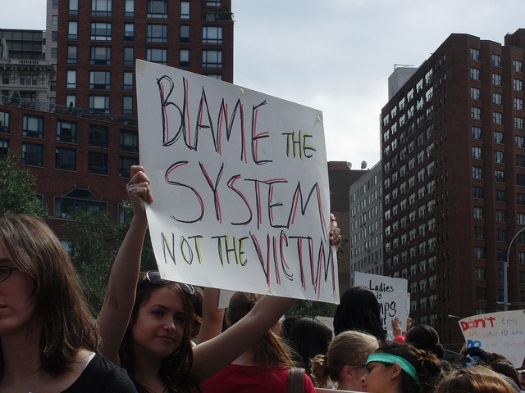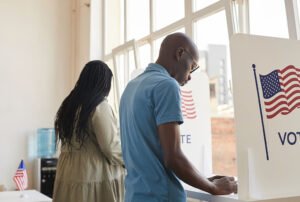
May 25, 2017, New York Times
Empathy suffers when people want to believe that the world is just, especially for them. Such was apparently the case when Ben Carson proclaimed to Armstrong Williams’ conservative radio audience, “I think poverty to a large extent is also a state of mind.”
Based on research last year conducted by Laura Niemi at Harvard and Liane Young at Boston College, one might add that Carson’s belief might also serve as his oath of loyalty to Trump. These researchers found that “the more strongly you privilege loyalty, obedience and purity—as opposed to values such as care and fairness—the more likely you are to blame the victim.”
To be fair, Carson may have simply tried to express the doctrine of positive thinking. However, he added these comments:
You take somebody that has the right mind-set, you can take everything from them and put them on the street, and I guarantee in a little while they’ll be right back up there. You take somebody with the wrong mind-set, you can give them everything in the world—they’ll work their way right back down to the bottom.
Dr. Ben Carson, the 17th and current Secretary of Housing and Urban Development, a Cabinet department created as part of the “Great Society” program of President Lyndon Johnson in 1965, also told Williams that, according to the Times, “helping people may not better their lives.”
Sign up for our free newsletters
Subscribe to NPQ's newsletters to have our top stories delivered directly to your inbox.
By signing up, you agree to our privacy policy and terms of use, and to receive messages from NPQ and our partners.
Blaming the poor for their circumstances requires a particular set of moral values. Carson asserted that being gay is a choice. He endorsed Trump. He claimed, “9 out of 10 nonprofits fail.” He was opposed to a Muslim becoming president. He likened some Syrian refugees to “rabid dogs.” When he called many Americans “stupid,” he defended his statement by saying that he was referring to Americans “who take the disadvantaged people in our country and say, ‘You poor little thing, I’m going to give you everything that you possibly need.’” Carson called the Affordable Care Act “the worst thing that has happened in this nation since slavery.” Carson said America’s slaves were immigrants. (President Obama actually said something similar.) Reason.com reports that he compared the U.S. government to Nazi Germany in nine specific ways. He criticized federal efforts to desegregate America’s neighborhoods as “social engineering.” He said, “We’d be Cuba if there were no Fox News.”
Victim blaming comes in many forms and is often subtle. It can apply to cases of sexual assault or street crime, but also to blaming the poor for being poor. When someone defaults to questioning what a victim could have done differently to prevent a terrible outcome, he or she is participating in the culture of victim blaming.
If Carson were merely a retired pediatric neurosurgeon and failed presidential candidate, his remarks could be easily ignored. But once he took up the mantle of Secretary of HUD, people such as actor and rights activist George Takei immediately took to Twitter to express outrage: “Ben Carson says that poverty is a ‘state of mind.’ You know what else is a state of mind? Always being a blithering idiot.”
Carson’s personal story includes many positive and negative aspects associated with the African American experience and presumably informs his current viewpoints on race, poverty, and upward mobility. Being raised in very modest circumstances, his family dealt with his father’s bigamy (resulting in separation when Carson was eight). The young Carson experienced economic and domestic insecurity, including his single mother’s attempted suicide and several psychiatric hospitalizations for depression. By high school, the family’s economic situation had improved and Carson began to excel at academics, setting the stage for his successful career.Writing for the New Yorker shortly before the last presidential election, James Surowiecki quotes Hillary Clinton in her debate with Donald Trump about the issues that HUD was created to help address: “Race still determines too much. It often determines where people live, determines what kind of education in their public schools they can get, and, yes, it determines how they’re treated in the criminal justice system.” Surowiecki adds that fifty years after the civil rights movement, the wealth gap is growing at an alarming rate.
But the wealth gap between black and white Americans is much bigger than the income gap, thanks to a toxic combination of institutionalized discrimination, persistent racism, and policies that amplify inequality. As Thomas Shapiro, a sociologist at Brandeis and the co-author of the seminal book Black Wealth/White Wealth, told me, “History and legacy created the racial gap. Policies have maintained it.” Together, they contribute to what he’s called “the hidden cost of being African American.”
Many have observed that Trump’s cabinet is constituted by people uniquely qualified to destroy the departments they are sworn to steward. Carson took an oath when he became a doctor to protect his patients. Never before have so many people depended on his competence and good intentions. During his career as a surgeon, egos, reputations, and livelihoods competed with what was best for the patient in the operating theater. The doctor working as a member of the team—listening, collaborating, communicating—is what is best for the patient. The culture of medicine is such that everything depends on what the team leader, the doctor, decides. What will he decide now? To whom is Carson pledging his loyalty as Secretary of HUD?—James Schaffer













